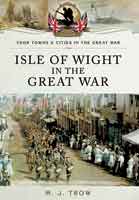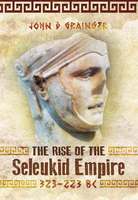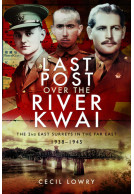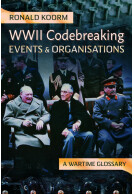Wavell (Paperback)
Soldier & Statesman
Imprint: Pen & Sword Military
Pages: 528
ISBN: 9781399022743
Published: 17th November 2022
(click here for international delivery rates)
Need a currency converter? Check XE.com for live rates
| Other formats available | Price |
|---|---|
| Wavell eBook (3.0 MB) Add to Basket | £6.99 |
Archibald Wavell's life and career makes a marvellous subject. Not only did he reach the highest rank (Field Marshal) and become an Earl and Viceroy of India but his character was complex. He joined the Black Watch in 1901. He stood out during the Great War, quickly earning the Military Cross but losing an eye. He was at Versailles in 1918 but between the Wars his career advanced with Brigade and General commands notably in Palestine where he spotted Orde Wingate. By the outbreak of war he was GOC-in-C Middle East.
Early successes against the Italians turned into costly failures in Greece and Crete and Wavell lost the confidence of Churchill; their temperaments differed completely. Wavell was sent to India as C-in-C. After Pearl Harbour Wavell was made Supreme Allied Commander for the SW Pacific and bore responsibility for the humiliating loss of Singapore (he quickly recognized that it could not be held). Problems in Burma tested Churchills patience and he was removed from command to be Viceroy and Governor General of India. As civil unrest and demands for independence grew, in 1947 Prime Minister Attlee replaced Wavell with Mountbatten who oversaw Partition.
Wavell died in 1950, after a life of huge achievement tempered with many reverses, most of which were not of his making.
As one of the great military leaders of the Second World War and the penultimate Viceroy of India Archibald Wavell makes a marvellous subject for a biography. This book is superbly written and objectively researched
Pennant Magazine
Archibald Wavell's life and career makes a marvelous subject. Having joined the Black Watch in 1901, his career spanned the Great War where he lost an eye, attendance at Versailles in 1918, Brigade and General commands in Palestine where he spotted Orde Wingate, and at the outbreak of WWII he was GOC-in-C Middle East. A fascinating, complex man.
reenacting ww2
Archibald Percival Wavell graduated from the Royal Military Academy Sandhurst in 1901 and was commissioned into the Black Watch - the start of a long military career stretching across two world wars, a career in which Wavell attained the rank of Field Marshal and become an Earl and Viceroy of India. This is a remarkably well researched and referenced insight into this complex character.
Reconnaissance Report
Archibald Wavell, as his name implies (his grandfather, father, and son were all soldiers, and all were called Archibald Wavell) was a General of the old school: conservative, steady as a rock, upright, unflappable - and often very unlucky. Of him, it can truly be said, as his fellow British Indian Rudyard Kipling wrote in If, that he met the two imposters, triumph and disaster, with the same calm and impervious integrity.
Military Times, Jan 2011
A child of the Raj born in 1883, Wavell had a conventional upper-class education at Winchester and Sandhurst; he spent a year attached to the Russian army, and fought in his native India and the Boer War. A Staff Campaign in 1914, he lost an eye - but gained a military cross - at Ypres in 1915. Between the wars, Wavell proceeded up the ranks in a zig-zag fashion, once forced to go down in rank, and twice spending periods of unemployment on half pay. His mixed fortunes reflected the serious neglect suffered by the Armed Forces in what has passed for peacetime, but was really only an interval between wars - and could stand as an object lesson to Government in our own day as it implements damaging military cuts.
In 1935, Wavell found his feet combatting an Arab insurgency in British-ruled Palestine, and thereafter progressed rapidly up the ladder. By 1940, he was a full General commanding the vital Middle East theatre, sitting astride embattled Britain's communications with India and the Far East. His greatest military triumph came early when his miniscule and ill-equipped forces smashed the numerically superior Italians in Libya and drove them out of the Horn of Africa. The whole of North Africa was his for the taking when he was forced by Churchill to divert scarce men and resources to the futile attempt at saving Greece and Crete from the German invaders.
By the time the defeated troops returned to North Africa, the Germans had a formidable foothold there, to, in the shape of Rommel's Afrika Korps. But the Desert Fox proved a less daunting foe than the one Wavell faced in Downing street. The voluble, mercurial Churchill was the polar opposite of taciturn, immobile, Wavell, and their dislike was mutual. Churchill's distrust had been kindled by Wavell's reluctance to go into Greece. The fact that he was proved right rankled, and when Wavell seemed similarly slow to invade Iraq and put down a pro-Nazi coup, Churchill seized his opportunity to make him swap jobs with Auchinleck, the Commander-in-Chief in India.
Once again, Wavell did wonders with few men and resources, ad once again he irritated Churchill by correctly predicting the fall of singapore. The Prime Minister interpreted Wavell's cold military realism as pessimism, and his calmness as inertia' and finally got rid of him by kicking him upstairs to be India's Viceroy. An old India hand, Wavell proved an unexpected success in this role; but his attempts to bring the sub-continent's squabbling politicians together was frustrated (again) by Chruchill, who opposed Indian independence. When Wavell handed over to Mountbatten, the last Viceroy and retired, it must have been with some relief. In a display of petty meaness Churchill refused to attended his funeral in 1950.
Victoria Schofied, herself an old India hand and a rare woman in the male-dominated field of military history, has done Wavell proud in a fine and full biography that pays due attention to his happy family life and the sensitive poetry-loving man behind the gruff and silent facade. He may not have had the dazzle and ego of Monty or Mountbatten, but Wavell was a far finer and sounder man in the mould of his rival and replacement Auchinleck. And to cross Churchill in World War Two was a very brave thing to do.
Wavell, Soldier & Statesman, by Victoria Schofield, dropped through my door with a thud - it's a weighty tome... Oddly enough I had just finished reading volume 2 of John Connell's 1969 biography, Wavell, Supreme Commander.
Rob Widders
Connell's book, for me at least, paints a warmer picture of Wavell than Schofield does. But overall she has put together a well researched and readable account that manages to cover a lot of ground in its 528 pages. It's a good solid piece of work and I enjoyed reading it.
I must confess I had probably conformed to the wider orthodoxy on British military history when it came to Wavell – everything before Monty was hopeless, surely? This perceived wisdom is partly due to efforts of both Montgomery the self-publicist and Churchill, whose history of the Second World War set the tone for the historiography of the conflict. Victoria Schofield is an authority on the Indian sub-continent, and has also written an official history of Wavell’s Regiment, the Black Watch. Therefore, she is ideally placed to try and redress Wavell’s poor treatment through history.
Daly History Blog
But reading this book has made me think differently. Prior to El Alamein the British Army and its commanders were swimming against the tide – poorly equipped, poorly prepared, and with far too much being expected of them in the circumstances. Wavell was by no means the only British General whom Churchill castigated for not moving heaven and earth in the way that he demanded, and because he did not fit Churchill’s ridiculous stereotype of what a General should ‘be’. This gives us an insight into Churchill’s failings in terms of working with his commanders – men such as Auchinleck, Dill, and even Montgomery also suffered from Churchill’s outbursts....
...
The impression I have of Field Marshal Wavell is of a very quiet, private but very intelligent man who did the best that could be expected of him at the time. It should be no reflection on him at all that the Prime Minister of the day found it difficult to trust his subordinates, and at times showed very poor judgement of character. A much-maligned figure in British military history, Wavell seems to have suffered not only from being in the wrong commands at the wrong time, but also from his modest nature, not unlike other commanders such as Alan Brooke and Bill Slim, who have been overshadowed by publicists such as Montgomery, or dashing warriors such as Alexander. How might Wavell and Auchinleck have fared later in the war when resources were behind the allies? By the same token, how might Montgomery have fared commanding earlier in the war when the cards were heavily stacked against Britain?
Hopefully Victoria Schofield’s masterly biography will go some way to redressing the harsh treatment that Wavell has been afforded by history. Schofield makes the case for Wavell very well, which is just as well given that all the evidence suggests that he was, unjustly, one of the most maligned figures of the Second World War. I’m by no means a fan of the official military biography, but this example is very well done indeed.
Archibald Wavell's life and career makes a marvellous subject. Not only did he reach the highest rank (Field Marshal) and become an Earl and Viceroy of India but his character was complex. He joined the Black Watch in 1901. He stood out during the Great War, quickly earning the Military Cross but losing an eye. He was at Versailles in 1918 but between the Wars his career advanced with Brigade and General commands notably in Palestine where he spotted Orde Wingate. By the outbreak of war he was GOC-in-C Middle East.Early successes against the Italians turned into costly failures in Greece and Crete and Wavell lost the confidence of Churchill; their temperaments differed completely. Wavell was sent to India as C-in-C. After Pearl Harbour Wavell was made Supreme Allied Commander for the SW Pacific and bore responsibility for the humiliating loss of Singapore (he quickly recognized that it could not be held). Problems in Burma tested Churchill s patience and he was removed from command to be Viceroy and Governor General of India. As civil unrest and demands for independence grew, in 1947 Prime Minister Attlee replaced Wavell with Mountbatten who oversaw Partition.Wavell died in 1950, after a life of huge achievement tempered with many reverses, most of which were not of his making.
spartacus Educational
About Victoria Schofield
VICTORIA SCHOFIELD, who has edited and expanded The Rescue Ships, is an award- winning historian and biographer with a specialist interest in South Asia, military and naval history. Her books include Wavell, Soldier and Statesman (in print with Pen & Sword Books), the two-volume official history of The Black Watch, and Kashmir in Conflict. She is Vice Admiral Schofield’s daughter.














